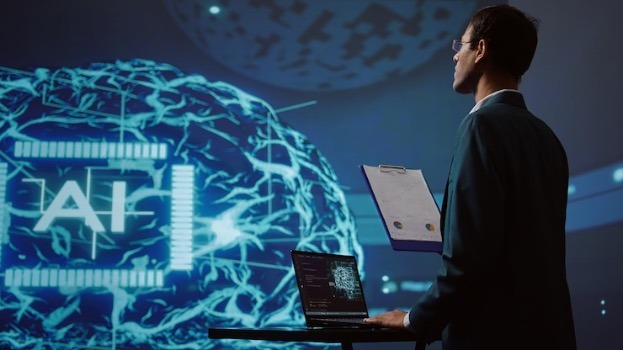IIT Madras WSAI Partners With Lloyds For AI Research
Share

In a bold step to foster the interface between industry and academia, IIT Madras Wadhwani School of Data Science and Artificial Intelligence (WSAI) has signed an alliance with the Lloyds Technology Centre in a strategic partnership. The partnership is likely to extend the frontiers of research in Machine Learning (ML) and Artificial Intelligence (AI) while, at the same time, making it possible for real-world industry challenges to be addressed with the prowess of academic intellectual capital.
The agreement was formalised at the IIT Madras campus in the presence of Prof. Balaraman Ravindran, Head of WSAI, and Sirisha Voruganti, CEO and Managing Director of Lloyds Technology Centre. This new alliance brings together WSAI’s academic and research capabilities with the real-world industry needs of Lloyds, one of the key technology arms of Lloyds Banking Group.
The motive behind this collaboration is multi-faceted. Central to it is the desire to fill the conventional industry-academia divide that has slowed innovation. Through the convergence of rigorous academic research with real industrial requirements, the partnership is likely to bring forth innovative solutions, most importantly in fields where AI and ML will be a game-changer. These fields are banking, finance, pensions, insurance, and investments.
Prof. Ravindran said that WSAI has centered on facilitating and encouraging research in data science and AI in seven core disciplines. “We set the foundation for developing strong, lasting partnerships last year. The partnership with Lloyds Technology Centre is a significant step on this path,” he further added. Prof. Ravindran also stated that the tie-up is not for just a specific project or for a short-term objective but is a long-term, multi-faceted association involving research as well as skill development.
One of the main strengths of the initiative is formal training and certification of engineers from the Lloyds Technology Centre. These engineers will be given special training in Advanced Data Engineering and AI/ML from the WSAI faculty and its certified academic curriculum. This not only provides Lloyds engineers with the best available knowledge at present but also enriches the learning ecosystem where both organizations learn from each other.
Already, a group of Lloyds scientists and engineers began training at WSAI, reinforcing the genuine commitment on both sides to the principle that this collaboration must make its impact from day one. Beyond capacity building, bespoke AI issues are being defined and explored, namely in the field of banking and finance, where forecasting models, risk computation, and customer-focused technologies are essential.
Sirisha Voruganti concurred with this view and seemed hopeful about the potential and scope of this academia-industry convergence. She stated, “The immense potential to learn from data with the rise in AI is huge. At Lloyds Technology Centre, we work day in and day out to provide solutions which are faster, better, and cheaper to customers.”. As our interest extends to insurance, pension, investments and more, this collaboration will enable us to collaborate closely with WSAI researchers to create even smarter, more efficient prediction models.
Voruganti also emphasized ongoing employee education. Lloyds not only is investing in short-term engineer development but is dedicated to a long-term learning process. Workers will be sponsored to learn WSAI courses and become certified in advanced-level AI disciplines, possessing an employee base that is not only technologically qualified but is constantly renewing with newer trends.
The collaboration is a new paradigm of knowledge exchange — where research at universities is driven by relevant problems, and industries receive research-driven, fact-based solutions. The collaboration is also reflective of the larger trend in India’s higher education and innovation ecosystem, whereby institutions such as IIT Madras are not merely teaching institutions but also champions of technological changes in cooperation with international industry partners.
Lloyds-WSAI is one of the best examples for future institutions that aim to achieve real-world influence by uniformly integrating theoretical studies and applied utilization. With the global AI and ML ecosystem repeatedly redefining itself at such a fast pace, such platforms as this are made obligatory in order to remain ahead of the trend curve, drive innovation at a faster rate, and yield value both to industry and academia.












